When we think of developing new websites, we think of CSS, HTML, JavaScript. However, what will keep all these components together and guide what and how to do is PHP.
Are you looking for #PHP #Frameworks? Take a look at these most popular ones in 2021!
One can often hear that PHP technologies are outdated and no longer used. However, according to research, almost 80% of all websites in the world use PHP. The truth is that currently, some of the world’s most famous names use PHP. Those are certainly Facebook and Wikipedia. PHP-based applications use PHP frameworks to help developers write and compile their code.
Further, in the text below, we will explain what PHP frameworks are and which ones are the most popular today.
What Is a PHP Framework?
PHP framework is a platform used to create PHP applications. Each PHP framework has unique code libraries for the functions that are most commonly used. It reduces the amount of code you need to write manually.

Using a PHP Framework Has Many Advantages
Speed of development – since most PHP frameworks have built-in code libraries, there is no need to write complete code manually. All you have to do is select a predefined code and do the optimization.
Common libraries – there are many tasks that most programmers need to perform, and these tasks are repetitive and often used. Instead of writing down your features, you can use the ones that came with the Framework.
Clean and well-written code – most frameworks sort the code within the directories by the most commonly used functions. This way, your code will always be clean and easy to read.
Security – like any other programming language, PHP is vulnerable. There are many types of attacks on PHP applications. If you do not take the appropriate code protection steps, your applications are vulnerable. Using the PHP Framework reduces the possibility of hacker attacks because they have security structures inside that prevent the most commonly used attacks.
According to the Internet, there are over 40 PHP frameworks, although there’s a real possibility that many more exist.
The Most Popular PHP Frameworks
1. Laravel
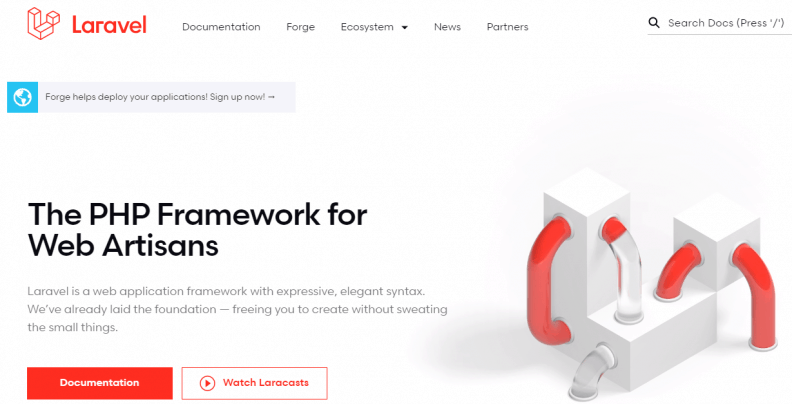
Laravel is currently the most popular PHP Framework, and it was created in 2011. Developed by Taylor Otwell – he wanted a framework with elements he couldn’t find on Codeigniter, such as user authentication elements.
Laravel uses PHP version 7.2.5 or later and works with MySQL, PostgreSQL, SQLite, and SQL Server databases.
Within Laravel, there is a Laravel Homestead virtual development environment. It is a development environment that will allow you to work without installing PHP, some web server, or any other software on your local computer. For Mac users, Laravel Valet is available as an ideal development environment.
Inside Laravel is an interface for templates called Blade. Its most significant advantage over other frameworks is that you can use PHP within Blade.
This framework boasts Packalyst, a collection of Laravel packages, and there are more than 15,000 packages that you can always use in any project. Incredible, right?!
It is a very secure PHP framework, and among the security components, it contains authentication, authorization, email verification, encryption, hashing, and password reset.
If you have a problem related to Laravel, you can always contact a large customer base and ask for help. It is simple as that!
Some of the largest communities for Laravel are Laracasts, Laravel.io and Podredit Laravel. There you can also find a lot of learning and programming materials to learn the Laravel PHP framework.
Some of the world’s biggest brands use Laravel to manage their sites, and the most famous are Vogue archive, Restaurants.com, Explore Georgia, and so on.
When developing new websites, it’s essential to choose PHP frameworks like Laravel, known for its elegant and developer-friendly architecture, to streamline the development process and ensure that even a novice Laravel developer can quickly get up to speed.
2. Symfony
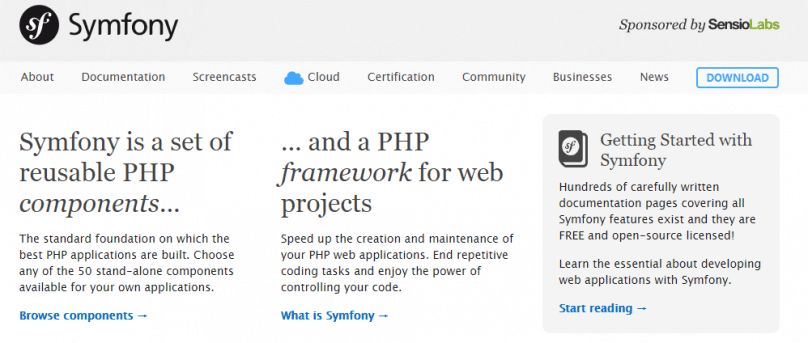
We can say that Symfony is an excellent PHP framework and a collection of PHP components for website development. It was launched back in 2005. This PHP framework uses PHP version 7.2.5 or later.
Symfony is an excellent framework for building scalable websites and applications. It has a modular system of components that allows you to select the key elements to your project with fewer clicks. As for databases, Symfony works with MySQL, Oracle, PostgreSQL, SAP Sybase, SQLite, and SQLServer databases.
This framework boasts a great debugging toolbar. As for templates, Symfony uses the Twig template tool, which is very simple, secure, and fast. Also, there are some predefined packages, more than 4000 of them, you can download and freely use in your projects.
Behind Symfony is Sensio Labs company, which means that you have professional support at your disposal, which other PHP frameworks do not have. There are many resources where you can learn a lot about this PHP framework or get help, and the most famous are the Sensio Labs learning platform, SymfonyCasts, Symfony certification, and conferences.
There are almost 700,000 developers who use this framework to find any help very quickly. Symfony is applied a lot, and it is also used by the biggest names in the world of CMS, like Drupal, Joomla, and Magento.
3. CodeIgniter
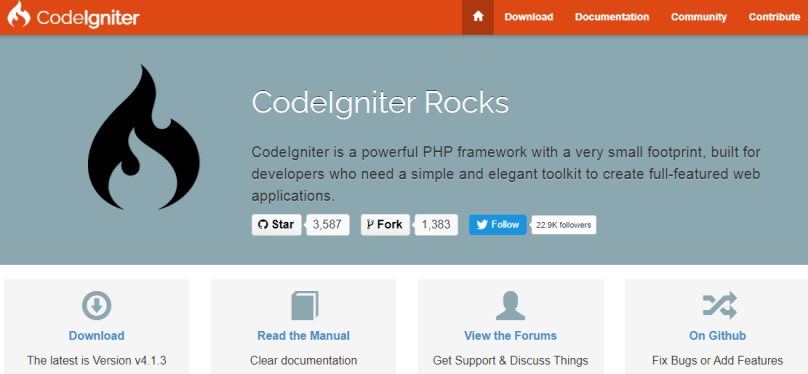
CodeIgniter is a great PHP framework that helps you quickly create a web application. It is a straightforward process because it is lightweight and has a minimal configuration.
It was created back in 2006, uses PHP version 7.2 or later, and works with MySQL, PostgreSQL, and SQLite3 databases.
The main feature of this framework is speed. Its installation is less than 1.5 MB, which means that there are no unnecessary components. However, you can add the ones you need at a given moment. It is very flexible and great for working with MVC architecture, although non-MVC applications can also be made.
Unlike other PHP frameworks, CodeIgniter contains more cache options, thus speeding up your applications. Today’s most prominent brands use CodeIgniter on their sites, and the most famous are Casio, G-Shock, Buffer, WooBox, Barracuda, FuelCMS.
4. Zend Framework / Laminas Project
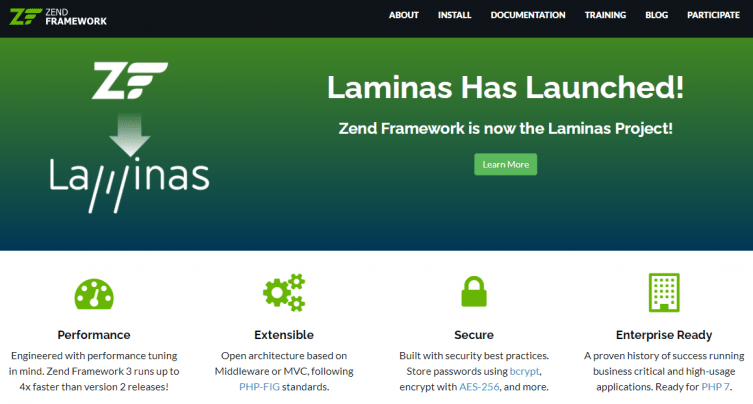
Zend Framework is one of the first PHP frameworks and is currently moving into the Laminas Project. It would be best if you considered migrating to Laminas as Zend will no longer be updated.
This framework was created in 2006. The current version of the Zend framework is 3.0 and Laminas 1.3.0.
The PHP version is 5.6 or later for Zend or 7.3 or later for Laminas. This framework works with MariaDB, MySQL, Oracle, IBM DB2, MS SQL Server, PostgreSQL, SQLite, and Informix Dynamic Server when it comes to databases.
The Laminas project consists of 3 parts: Laminas components and MVC, Mezzo, and Laminas API Tools.
Zend Framework has been installed almost 600 million times! Laminas project is one of the most commonly used PHP tools today. This framework uses PHP-FIG standards, which means that its code can easily be integrated into another framework and continue to be used there. It is possible to use only the necessary components without adding unnecessary ones that you will not need.
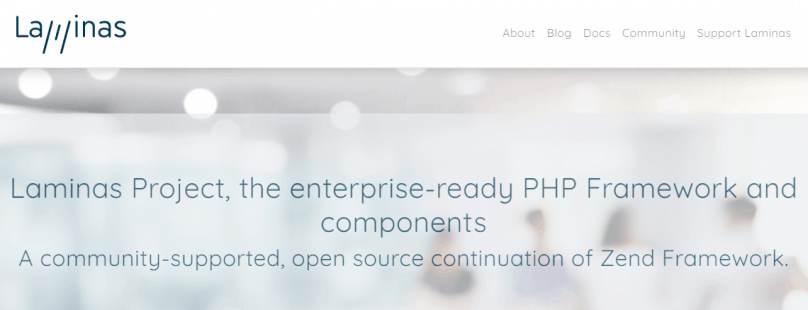
Zend has an extensive customer base, and among the big companies, we would point out the BBC, BNP Paribas, and Cisco Webex.
Conclusion
You should consider using a PHP framework. However, to take advantage of all that a PHP Framework offers, you need to have a good knowledge of PHP. Also, you need to understand the concepts behind each PHP framework.
Choosing the proper framework depends solely on you and what kind of application you make.
Suppose you are developing a PHP application and want to reduce the time you spend on development. If you are making a small application, opt for the PHP framework without redundant components.
Each of the listed PHP frameworks has an excellent knowledge base and many learning materials, so their use is maximally simplified.